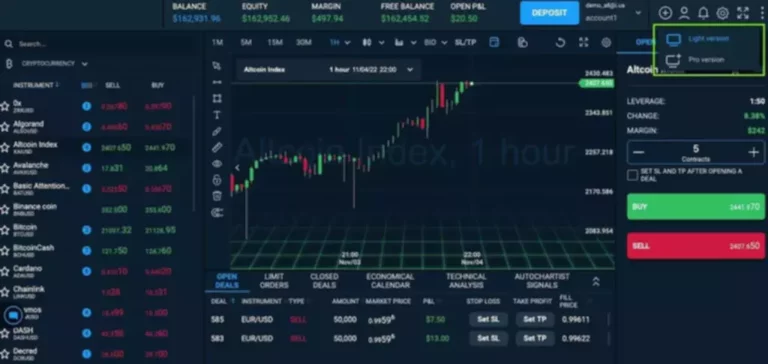Content
In the United States, Deloitte refers to one or more of the US member firms of DTTL, their related entities that operate using the “Deloitte” name in the United States and their respective affiliates. Certain services may not be available to attest clients under the rules and regulations of public accounting. Additionally, the practice works in concert Decentralized finance with the Deloitte AI Academy™ to bridge the AI talent gap and train thousands of practitioners on a wide range of AI skills, including model development and prompt engineering. Generative artificial intelligence (AI) could well be one of the most transformative technologies for the investment banking industry. Deloitte predicts that the top 14 global investment banks can boost their front-office productivity by as much as 27%–35% by using generative AI.1 This would result in additional revenue of US$3.5 million per front-office employee by 2026. Copyright law provides protections for original works of authorship fixed in a tangible medium.
The Future is Now: 3 Data Predictions 2024 That You Should Know
This section explores existing and emerging regulatory frameworks related to AI financial services. But neither protects core analysis without something inventive like broker ai an unconventional data science technique. For example, an AI report analyzing impacts of interest rate changes on bank stocks seems an obvious extension of existing analysis. Those referencing or repurposing AI financial models should evaluate these factors to build a fair use case.

What is the legal risk associated with GenAI models?
A current example of an ETF fueled by AI, https://www.xcritical.com/ is the AI-powered equity exchange-traded fund AIEQ. According to Sam Masucci, founder and CEO of ETF Managers Group, powered by IBM’s artificial intelligence Watson, this actively managed portfolio is the first of its kind, which operates the fund. AI has also revolutionized the world of algorithmic trading, also known as quantitative trading. Algorithmic trading relies on predefined rules and mathematical models to execute trades at high speeds and high frequencies.
Staying Ahead in the AI-Driven Investment Landscape
Whether you prefer short-term trades or long-term investments, Incite AI is your trusted partner for intelligent stock analysis. These AI market predictions are constantly updated and will always provide you with the most important information to make better decisions. Additionally, this type of machine learning capability can be integrated into trading algorithms and platforms to provide real-time analysis and data-driven conclusions. Overall, the ability of generative AI to process and understand large amounts of data can help traders and trading bots make more informed and profitable decisions. The U.S. Securities and Exchange Commission (SEC) has already taken note of the risks posed by AI. By leveraging AI technology, investment managers can access sophisticated tools that automate portfolio allocation, rebalancing, and risk management.
The next frontier in investment management
Trust in our advanced algorithms and let Incite AI guide you towards optimal investment opportunities. At Permutable, we know that explainability in our AI systems is crucial – especially for our clients who are increasingly relying on our trading tools to get ahead. As AI trading investment becomes more prevalent, there’s a growing demand for transparency.

This approach allows multiple entities to train AI models without sharing sensitive data. And this is why we believe federated learning will play a significant role in the future of AI trading investment. Besides, even though it is less costly and more efficient in some cases to employ AI investment advisors, personal contact and human discretion will be imperative at certain stages of investing.
AI tools can help compare investment strategies to those of other investors or benchmarks in a specific sector or industry. Investors can then contextualize their financial standing and decide whether they need to improve their strategy. Stress testing involves testing an investment strategy on historical data or through a simulation to see how it holds up under various circumstances. Investors can then detect flaws in their strategies and determine steps to strengthen their financial standing. In addition to predictive models, investors can use AI technologies to produce risk models.
The GPU advancement has rendered obsolete most computational electronics from before 2020 obsolete. Demand from AI is rapidly consuming existing data center capacity, pushing companies to build new facilities. Utilities may have to add coal- or gas-fired power and rising demand will undoubtedly spark infrastructure investments and efforts to develop a more energy efficient network, better cooling systems and new solutions to integrate renewable energy.
As the AI landscape continues to evolve, new opportunities are emerging for investors, entrepreneurs, and policymakers. Let’s explore some of the key areas that are likely to shape the future of AI investments. The AI investment landscape is dominated by a cadre of prominent venture capital firms that have recognized the sector’s immense potential. These investors are shaping the future of AI through strategic capital allocation and support for innovative startups.
This fact is also supported by DTCC when it believed in the AI revolution in capital markets. PwC estimates that AI could contribute up to $15.7 trillion to the global economy by 2030. However, this growth may not be evenly distributed, potentially exacerbating economic inequalities between AI leaders and laggards. The EU’s approach to AI investment is characterized by a focus on ethical considerations and regulatory frameworks. While lagging behind the U.S. and China in total investment, the EU is carving out a niche as a leader in responsible AI development. The country’s AI market is projected to exceed $61 billion by 2025, with VC investments of approximately $120 billion in recent years.

Any existing policies and procedures may be similarly enhanced to address conflicts of interest related to AI, potential customer harm, and potential regulatory violations. For example, firms may determine to be deliberate and intentional about their use of any new AI systems, explicitly requiring review and assessment of such AI before personnel are permitted to use it. Further, supervision by cross-function teams and periodic testing is also helpful to understand how the AI systems are performing. Current AI technology is limited to artificial narrow intelligence (ANI), which is designed to perform a single or narrow set of tasks. Although we have witnessed tremendous progress in machine and deep learning, AI is still limited to performing just certain tasks with increased proficiency. ChatGPT is a generative multimodal model limited to producing natural language responses.
The 28-employee company claims that Holly can execute discretionary trading for investors without needing much input from the traders. According to Sigmoidal, an investment manager or a stock broking firm might use their platform for algorithmic trading applications. For example in the case of trade executions, traders and investment managers at a stock rocking firm might gain access to insights on the most optimized way to execute their trades by means of a dashboard. For example, identifying CEO and CFO sentiments from earnings call transcripts, something which has been used in successful investment strategies.
- An important skill that proves useful in investment applications is the ability of LLMs to efficiently analyze and extract granular insights from existing textual data.
- Although we have witnessed tremendous progress in machine and deep learning, AI is still limited to performing just certain tasks with increased proficiency.
- This is especially enhanced by large language models capable of understanding and synthesizing complex documents.
- Brokers can become a single source of truth in developing a precise view of enterprise market and demand planning.
- The views, opinions, estimates and strategies expressed in this material constitute our judgment based on current market conditions and are subject to change without notice.
- Global corporate AI investment reached $92 billion in 2022, a six-time increase compared to 2016.
The ability to analyse vast amounts of data, identify patterns, and generate actionable insights enables investment managers to make informed decisions in real-time. By leveraging AI, investment managers can stay ahead of market trends, identify potential risks, and make well-informed investment choices. AI-driven algorithms have the ability to analyze vast amounts of data and identify patterns that are difficult for humans to detect. By leveraging AI for stock analysis, investors can gain valuable insights into market trends, price movements, and potential investment opportunities.
Morgan Securities LLC (JPMS), a registered broker-dealer and investment adviser, member FINRA and SIPC. Insurance products are made available through Chase Insurance Agency, Inc. (CIA), a licensed insurance agency, doing business as Chase Insurance Agency Services, Inc. in Florida. Changes in currency exchange rates and differences in accounting and taxation policies outside the U.S. can raise or lower returns. Some overseas markets may not be as politically and economically stable as the United States and other nations. In summary, while using AI in investing has challenges, prudent risk management and compliance steps can enable firms to tap benefits while minimizing legal exposure.